小学六年级英语语法一般过去时态
六年级英语上册动词的四种时态语法结构+例句
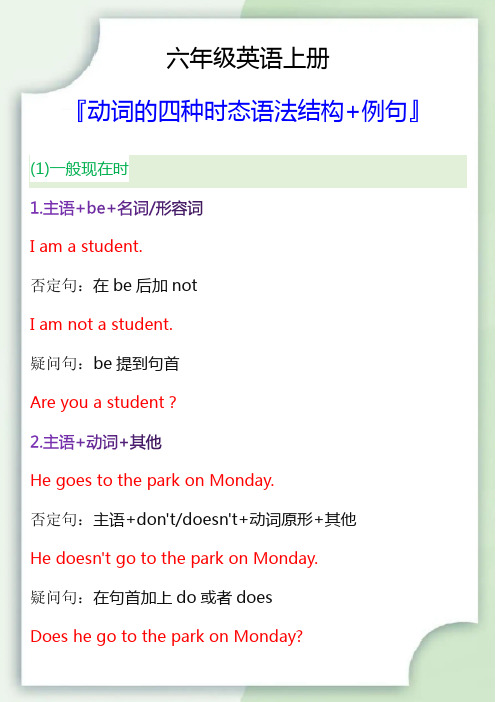
六年级英语上册『动词的四种时态语法结构+例句』(1)一般现在时I am a student.否定句:在be后加notI am not a student.疑问句:be提到句首Are you a student?He goes to the park on Monday.否定句:主语+don't/doesn't+动词原形+其他He doesn't go to the park on Monday.疑问句:在句首加上do或者doesDoes he go to the park on Monday?(2)一般过去时He went to the market.否定句:在动词前加didn't,动词恢复原形;在be后加not He didn't go to the market.疑问句:在句前加did,或将be提到句首Did he go to the market?(3)一般将来时She is going to ride a horse.否定句:在be后加notShe is not going to ride a horse.疑问句:将be提到句首Is she going to ride a horse?I will go to the library.否定句:在will后加not,或缩写为won't I will not go to the library.疑问句:将will提到句首Will you go to the library?(4)现在进行时They are reading English.否定句:在be后加notThey are not reading English.疑问句:将be提到句首Are they reading English?回答:Yes, they are./No, they aren't.。
新标准英语六年级下册一般过去时语法复习与练习
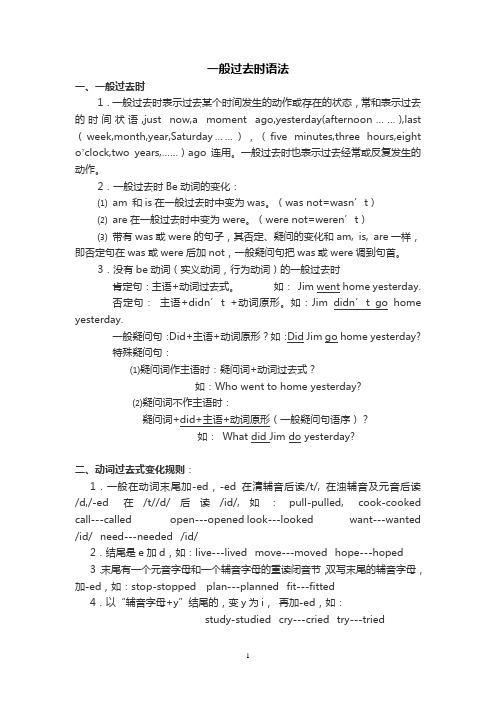
一般过去时语法一、一般过去时1.一般过去时表示过去某个时间发生的动作或存在的状态,常和表示过去的时间状语,just now,a moment ago,yesterday(afternoon……),last (week,month,year,Saturday……),(five minutes,three hours,eight o’clock,two years,……)ago连用。
一般过去时也表示过去经常或反复发生的动作。
2.一般过去时Be动词的变化:⑴ am 和is在一般过去时中变为was。
(was not=wasn’t)⑵ are在一般过去时中变为were。
(were not=weren’t)⑶带有was或were的句子,其否定、疑问的变化和am, is, are一样,即否定句在was或were后加not,一般疑问句把was或were调到句首。
3.没有be动词(实义动词,行为动词)的一般过去时肯定句:主语+动词过去式。
如: Jim went home yesterday.否定句:主语+didn’t +动词原形。
如:Jim didn’t go home yesterday.一般疑问句:Did+主语+动词原形?如:Did Jim go home yesterday?特殊疑问句:⑴疑问词作主语时:疑问词+动词过去式?如:Who went to home yesterday?⑵疑问词不作主语时:疑问词+did+主语+动词原形(一般疑问句语序)?如:What did Jim do yesterday?二、动词过去式变化规则:1.一般在动词末尾加-ed,-ed在清辅音后读/t/, 在浊辅音及元音后读/d,/-ed在/t//d/后读/id/,如:pull-pulled, cook-cooked call---called open---opened look---looked want---wanted /id/ need---needed /id/2.结尾是e加d,如:live---lived move---moved hope---hoped3.末尾有一个元音字母和一个辅音字母的重读闭音节,双写末尾的辅音字母,加-ed,如:stop-stopped plan---planned fit---fitted 4.以“辅音字母+y”结尾的,变y为i,再加-ed,如:study-studied cry---cried try---tried 以“元音字母+y”结尾的,直接加-ed,如:play-played enjoy---enjoyed5.不规则动词过去式:如am, is-was, are-were, do-did,has,have-had see-saw, say-said……等不规则动词的过去式的构成:1.把动词原形中的i改为a,变成过去式。
六年级英语语法知识点汇总
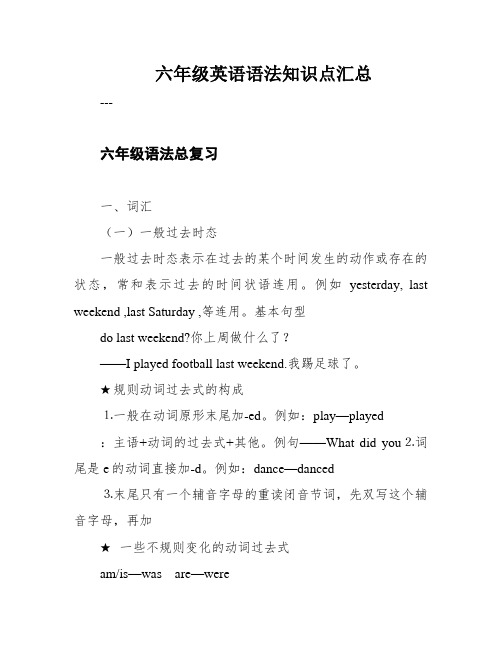
六年级英语语法知识点汇总---六年级语法总复习一、词汇(一)一般过去时态一般过去时态表示在过去的某个时间发生的动作或存在的状态,常和表示过去的时间状语连用。
例如yesterday, last weekend ,last Saturday ,等连用。
基本句型do last weekend?你上周做什么了?——I played football last weekend.我踢足球了。
★规则动词过去式的构成⒈一般在动词原形末尾加-ed。
例如:play—played:主语+动词的过去式+其他。
例句——What did you⒉词尾是e的动词直接加-d。
例如:dance—danced⒊末尾只有一个辅音字母的重读闭音节词,先双写这个辅音字母,再加★一些不规则变化的动词过去式am/is—was are—weresee—sawtake—tookread—read觉)—slept-ed。
例如stop(截止)--stopped⒋结尾是“子音字母+y”的动词,变“y”为“i”,再加-ed,例如:study--studiedgo—wentcome—cameswim—swam fly—flewbecome—becamedo—didget—gothave—haddraw—drewsay—saidhurt—hurtsleep(睡win—wontell—toldwill—wouldeat—ate take—tookcut(切)--cutsit(坐)—satthink—thoughtfind—foundmake—made drink—drankrun(跑)---ranwear—worebegin(入手下手)—beganbuy—boughtgive(给)—gave sing—sang(二)普通目前时态leave—left hear(听)--heart普通目前时态透露表现包孕目前工夫在内的一段工夫内经常发生的举措或存在的状况,透露表现习气性或客观存在的究竟和谬误。
小学英语 六年级四种时态总结
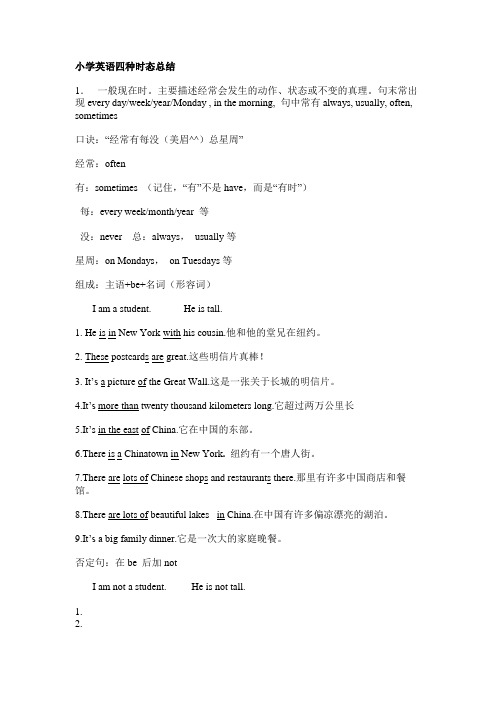
小学英语四种时态总结1.一般现在时。
主要描述经常会发生的动作、状态或不变的真理。
句末常出现every day/week/year/Monday , in the morning, 句中常有always, usually, often, sometimes口诀:“经常有每没(美眉^^)总星周”经常:often有:sometimes (记住,“有”不是have,而是“有时”)每:every week/month/year 等没:never 总:always,usually等星周:on Mondays,on Tuesdays等组成:主语+be+名词(形容词)I am a student. He is tall.1. He is in New York with his cousin.他和他的堂兄在纽约。
2. These postcards are great.这些明信片真棒!3. It’s a picture of the Great Wall.这是一张关于长城的明信片。
4.It’s more than twenty thousand kilometers long.它超过两万公里长5.It’s in the east of China.它在中国的东部。
6.There is a Chinatown in New York.纽约有一个唐人街。
7.There are lots of Chinese shops and restaurants there.那里有许多中国商店和餐馆。
8.There are lots of beautiful lakes in China.在中国有许多偏凉漂亮的湖泊。
9.It’s a big family dinner.它是一次大的家庭晚餐。
否定句:在be 后加notI am not a student. He is not tall.1.2.3.4.5.6.7.8.9.疑问句:be 动词提前到第一位。
六年级英语语法之一般现在时、过去时、将来时,现在进行时

六年级英语语法之⼀般现在时、过去时、将来时,现在进⾏时1. ⼀般现在时(1)⼀般现在时中的be动词:⼀般⽤原形:am is are。
am⽤于第⼀⼈称单数(I);is⽤于第三⼈称单数(he she it和其他⼈名或称谓,如:Ben hissister等);are⽤于第⼆⼈称单数(you)和所有复数(包括第⼀⼈称复数we、第⼆⼈称复数you;第三⼈称复数they和其他复数,如the children 、 his parents等)。
例如:I am a boy 。
She is a good student。
You are the best。
They are aplle,pear and banana。
(2)⼀般现在时中的动词:①主语是第三⼈称单数(he she it 和其他,如Helen 、her cousin 等),动词后⼀般加s或es。
例如:She goes to school from Monday to Friday。
He likes to play basketball。
②主语不是第三⼈称单数,动词都⽤原形。
例如:I like milk。
They do homework together。
注意:⼀般现在时判断依据:①be动词是am、is、are;②动词⽤原形或加s、es;③没有时间状语或有usually、often、everyday、sometimes等不是具体的时间;2、⼀般过去时(1)⼀般过去时中的be动词:⼀般⽤过去式:was werewas⽤于第⼀⼈称单数(I)和第三⼈称单数(he she it和其他⼈名或称谓,如:Ben 、 hissister等);were⽤于第⼆⼈称单数(you)和所有复数(包括第⼀⼈称复数we、第⼆⼈称复数you;第三⼈称复数they和其他复数,如the children 、 his parents等)。
例如:I was at school just now。
完整版)六年级英语语法知识点汇总
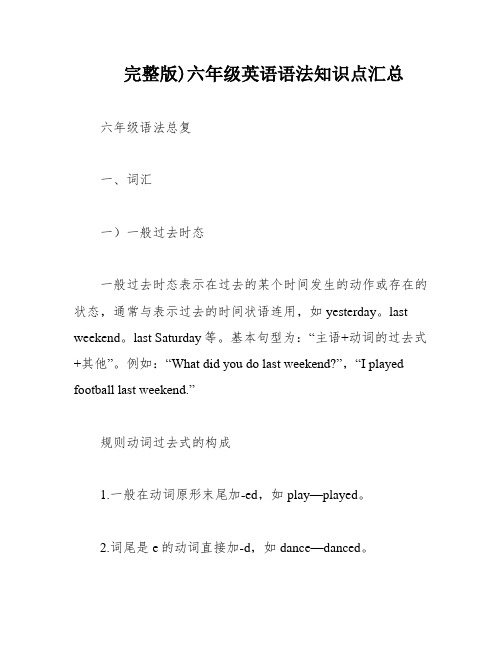
完整版)六年级英语语法知识点汇总六年级语法总复一、词汇一)一般过去时态一般过去时态表示在过去的某个时间发生的动作或存在的状态,通常与表示过去的时间状语连用,如yesterday。
last weekend。
last Saturday等。
基本句型为:“主语+动词的过去式+其他”。
例如:“What did you do last weekend?”,“I played football last weekend.”规则动词过去式的构成1.一般在动词原形末尾加-ed,如play—played。
2.词尾是e的动词直接加-d,如dance—danced。
3.末尾只有一个辅音字母的重读闭音节词,先双写这个辅音字母,再加-ed,(停止)ped。
4.结尾是“辅音字母+y”的动词,变“y”为“i”,再加-ed,如study--studied。
一些不规则变化的动词过去式am/is—was,are—were,see—saw,take—took,read—read,sleep(睡觉)—slept,go—went,come—came,swim—swam,fly—flew,e—became,do—did,get—got,have—had,draw—drew,say—said,hurt—hurt,win—won,tell—told,will—would,eat—ate,cut(切)--cut,sit(坐)—sat,think—thought,find—found,make—made,drink—drank,run(跑)—ran,wear—wore,begin(开始)—began,buy—bought,give(给)—gave,sing—sang。
二)一般现在时态一般现在时态表示包括现在时间在内的一段时间内经常发生的动作或存在的状态,表示惯性或客观存在的事实和真理,通常与often。
always。
usually。
sometimes。
六年级英语语法总结
六年级英语语法总结一、动词时态1. 现在进行时定义:表示现在正在进行的动作或存在的状态。
结构:be动词(am/is/are)+动词的现在分词形式(-ing)。
例句:I am doing my homework. 我正在做作业。
2. 现在完成时定义:表示过去发生的动作对现在造成的影响或结果。
结构:have/has+动词的过去分词形式(-ed)。
例句:I have finished my homework. 我已经完成了作业。
3. 一般过去时定义:表示过去某个时间发生的动作或存在的状态。
结构:动词的过去式。
例句:I did my homework yesterday. 我昨天做了作业。
二、名词1. 可数名词和不可数名词可数名词:可以计数的名词,如book(书)、apple(苹果)。
不可数名词:无法计数的名词,如water(水)、milk(牛奶)。
2. 名词的复数形式大多数名词的复数形式是在词尾加上s或es,如books、apples。
三、代词1. 人称代词:表示人称的代词,如I(我)、you(你)、he(他)、she(她)。
2. 物主代词:表示所有关系的代词,如my(我的)、your(你的)、his(他的)、hers(她的)。
四、形容词和副词1. 形容词:用来描述名词或代词的性质或特征,如red(红色的)、big(大的)。
2. 副词:用来描述动词、形容词或其他副词的程度或方式,如slowly(慢慢地)、quickly(快速地)。
五、介词1. 表示时间的介词:如in(在...里)、on(在...上)、at(在...点)。
2. 表示位置的介词:如in(在...内)、on(在...上)、at(在...处)。
六、定冠词和不定冠词1. 定冠词:表示特指,如the(这个)、that(那个)。
2. 不定冠词:表示泛指,如a(一个)、an(一个)。
七、句式结构1. 陈述句:陈述一个事实或观点,如I am a student.(我是一个学生。
小升初 六年级英语语法 一般过去时 动词过去式 课件ppt
3.They _____ in the USA last year.They _____ in China
now.
A.are ; were B.were ; are
C.was ; are
D.were ; was
Listen carefully
4. 实意动词过去式的变化规则
I walk to school every day.
一起练练吧
写出下列动词的过去式
like -- ______
do -- ______
dry -- ______
drop -- ______
think -- ______
know -- ______
sit -- ______
sleep -- ______
Listen carefully
一起练练吧
用动词的适当形式填空。 1)I _____ (have) an interesting party last weekend. 2)He _____ (watch) TV and _____ (read) a useful book yesterday. 3)They all _____ (go) to the mountains yesterday morning. 4)His father _____ (be) a taxi driver five years ago. 5)I _____ (take) some pictures yesterday.
我们就不:listen -- listened open -- opened visit -- visited
Listen carefully
口 诀:
• 过去式很简单,前提必须是动词 • 结尾有e只加d • 辅y结尾也不难,把y变i加ed • 末尾双写有哪些,辅音元音辅音记 • 其他动词很随和,带上ed成过去
六年级英语【八大时态标志词】单词汇总
already已经
yet还
just刚才
never从不
ever曾经
before以前
uptonow目前为止
sofห้องสมุดไป่ตู้r目前为止
recently最近
since+过去某一时间
twice两次
tillnow迄今为止
uptonow到目前为止
5.现在进行时
now现在
look看
listen听
atthistime此时
twiceamonth每月两次
threetimesaweek每周三次
2.一般过去时
ago以前
yesterday昨天
lasttime上次
lastnight昨晚
lastyear去年
lastterm上学期
lastMonday上周一
justnow刚才
once曾经
intheearlydays在早期
thedaybeforeyesterday前天
(2)before+过去时间点before8:00
(3)upuntil+过去时间点upuntilthen直到那时
6.过去进行时
atthattime在那时
atthatmoment在那时
thewholemorning整个早上
7.将来进行时
tomorrow明天
soon不久
nextweek下周
thedayaftertomorrow后天
8.过去完成时
(1)by+过去时间点bythetime到..时候为止
bythen到那时候bylasttime最后一次
3.一般将来时
tomorrow明天
英语所有语法知识点六年级
英语所有语法知识点六年级一、动词时态1. 一般现在时:用于表示经常性或普遍性的动作、情况或状态例句:I play football every Sunday.2. 一般过去时:用于表示过去某个时间发生的动作或状态例句:She watched a movie yesterday.3. 一般将来时:用于表示将来要发生的动作或情况例句:I will visit my grandparents next week.4. 进行时态:用于表示正在进行的动作例句:They are eating lunch now.5. 完成时态:用于表示已经完成的动作或状态例句:He has finished his homework.二、名词1. 可数名词与不可数名词例句:There are three apples on the table. (可数名词) I want some water. (不可数名词)2. 单数名词与复数名词例句:The dog is cute. (单数名词)The dogs are playing in the park. (复数名词)3. 名词所有格例句:Tom's book is on the table.三、形容词与副词1. 形容词用于修饰名词,表示名词的性质、特征或状态例句:She has a beautiful flower.2. 副词用于修饰动词、形容词或副词,表示方式、程度或时间等例句:He runs quickly.四、冠词1. 不定冠词(a/an)用于泛指单数可数名词前例句:I see an apple.2. 定冠词(the)用于特指或泛指某个人或物例句:The cat is on the table.五、代词1. 主格代词用于作主语例句:She is my friend.2. 宾格代词用于作宾语例句:He gave me a present.3. 物主代词表示所属关系例句:This is his book.六、介词1. 介词用于表示位置、时间、原因、方式等例句:He is in the park.2. 一些常见介词:in, on, at, with, for, to 等七、连词1. 并列连词用于连接同等重要的词、短语、句子等例句:I like apples and oranges.2. 从属连词用于引导从句例句:She is happy because she won the game.八、疑问词1. 疑问词用于构成疑问句例句:Where is the book?九、形容词比较级与最高级1. 形容词比较级用于表示两者之间的比较例句:She is taller than her sister.2. 形容词最高级用于表示三者或三者以上的比较例句:She is the tallest girl in the class.十、情态动词1. 情态动词用于表示能力、可能性、许可等例句:I can swim.十一、直接引语与间接引语1. 直接引语直接引述别人的原话例句:He said, "I am happy."2. 间接引语是对别人的话进行转述例句:He said he was happy.以上是六年级英语的所有语法知识点,掌握这些知识将会帮助你更好地理解和运用英语语法。
- 1、下载文档前请自行甄别文档内容的完整性,平台不提供额外的编辑、内容补充、找答案等附加服务。
- 2、"仅部分预览"的文档,不可在线预览部分如存在完整性等问题,可反馈申请退款(可完整预览的文档不适用该条件!)。
- 3、如文档侵犯您的权益,请联系客服反馈,我们会尽快为您处理(人工客服工作时间:9:00-18:30)。
小学六年级英语语法一般过去时态
过去时的时间状语:last(year, week, day, month, weekend)
Yesterday( morning, afternoon, evening).
I saw him yesterday in the street.
也可表示过去某个时间经常发生的动作,可与always, often 连用Liming always went to school on foot last year.
(a)be 动词的过去式:
I/He/she/it was(not)….You/we/they were….
一般疑问句was, were 放在句首。
(b)动词过去式:
肯定句:I watched cartoons.
She visited the zoo.
一般疑问句:Did you read book last night? Yes, I did. No, I didn't.
Did she clean the desk just now? Yes, she did. No, she didn't.
否定句:They didn't go the park yesterday.
He didn't make model ships last week.
(3)动词过去式的变化:
规则动词的变化:
A: 大部分动词直接在单词后面+ed 比如:planted,watered,climbed。
B: 以e结尾的动词直接+d,比如:liked。
C: 以辅音字母+y结尾的,直接去y +ied 比如: study-studied
D:以元音+辅音结尾的动词,必须双写最后一个辅音比如: stop –stopped
不规则动词的变化:
is/am-was, are-were, do-did, have/has-had, make-made, fly-flew/u:/
eat-ate, take-took, run-ran, sing-sang, drink-drank 等等
对于动词的不规则情况,我们采取看见一个记得一个的方式。
小学阶段要掌握的几个动词的过去时:
Watch TV_______ wash clothes _______ play football _________ clean the room ______
Visit grandparents _________ read a new book _______ go to a park __________
Go fishing __________ go swimming ___________ sing and dance _______ go hiking ________
Take picture _________ learn Chinese ____________ climb a mountain__________
eat good food_________ bring present __________ row a boat ____________
saw elephants _____________ go skiing__________ go ice-skating _____________
I.句子练习:
1.He _______ (visit) the Great wall last week.
2.We _______ (have) a good time yesterday.
3.We often _______ (go) to school by bus last year.
4.I ______ (live) in the village when I was a child.
5.Mike ______ (see) a big tiger in the nature park last year.
6.Sam _____(do) the housework yesterday.
7.______ (do) you __________ (enjoy) yourself yesterday?
8.________ (do) you _________ (play) the violin in the artroom
yesterday.------No, I didn’t. I ____( draw) some pictures there
9.I _____ (eat) a big pizza yesterday.
10.There ____ (be) many sheep on the farm last year.
11.I ________ (watch) a cartoon on saterday.
12.Her father _________ (read) a newspaper last night.
13.We _____ to zoo yesterday, they ________ to the park. (go)
14.______ you __________ (visit) your relatives last Spring festival?
15._____________ he __________ (fly) a kite on Sunday ?
Yes, he ________.
II选择填空
1.She watered the flowers__________
A tomorrow
B sometimes
C yesterday morning
2. What _________ Mike do last weekend ?
A do
B does
C did
3. I ____ my room last Sunday.
A cleaned
B clean
C am cleaning
4. I often help my mother ___________ housework.
A does
B did
C do
5. _______ you ________ TV last night.
A Do, watch
B Did, watch
C Did, watched
6. ----Did your father write an email yesterday?
A Yes, he did
B Yes, he does
C No, he don’t
7. They _____ on a trip in February ,2007.
A are going
B going
C went
8. We’re going to _____ moun tains tomorrow .
A climb
B climbed
C climbing
9. ____ he ____ football two days ago?
A Does , play
B Did , played
C Did , play
10. ----Good afternoon, Miss Lee. How does Mike feel?
-----He’s tired . He ____ a lot of work ______ .
A does , this morning
B do , this morning
C did , this morning
III.连词成句。
1.did, what, you, yesterday, do.
_______________________________________
2. watch, John, did, TV, weekend, last.
_______________________________________
3. went, I ,to, by, park, a, bike
_______________________________________
4. jumped, the, into, lake, he, and, swam.
____________________________________________
IV.根据句意,填上合适的单词。
1.-Where you go on your holiday?
- I a park。
2.- did you do on your holiday?
- I presents。
3.- did you go there?
- I went plane.。
